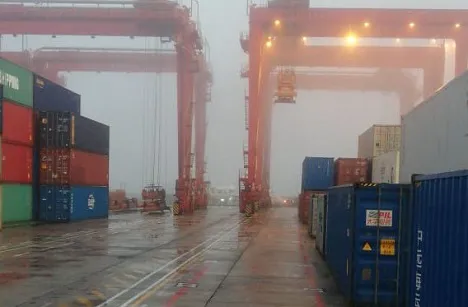A number of logistics companies in South Africa have been keeping their trucks off the roads since yesterday to ensure the safety of their drivers during an unofficial strike protesting the employment of foreign nationals while at Port Elizabeth and Durban harbours the number of Covid-19 cases rises.
The Covid-19 pandemic has hit Durban down to fourteen gangs, from eighteen gangs.
"All terminals' productivity are well below norm at the moment," says Mitchell Brooke, logistics manager at the Citrus Growers' Association.
Meanwhile the Cape coast has had strong wind and rain with more stormy conditions predicted for Thursday. Cape Town Harbour has shortly been fog-bound.
 Cape Town Container Terminal (courtesy of SA Trucker)
Cape Town Container Terminal (courtesy of SA Trucker)
Worry of Covid repeat at Port Elizabeth
A freight forwarder points out that a delay to road transport, as trucks keep off the road today for reasons of safety, has a major impact up and down the entire chain.
Packhouses and cold stores quickly fill up with citrus this time of the year.
"You lose about three days when you have to take your trucks off the road, it can take you five days to get the flow going again."
He continues: "We're very worried about Port Elizabeth Harbour because we know what happened at Cape Town Harbour and we're fearing a repeat of that in the Eastern Cape."
"Meanwhile, operationally Cape Town is actually looking up. There's definitely hope and that's particularly important for citrus going to the EU."
The delays at Cape Town Harbour are still estimated at around twelve days. "It'll take at least two to three months to get completely back on schedule at Cape Town," he says.
Over the past two weeks fewer citrus consignments, much of it EU-bound, were trucked from the Western Cape to Port Elizabeth and Nqgura harbours. The reduction came partly because of the additional costs to road transport and partly because of Port Elizabeth's capacity to handle the extra volumes.
Machinery breakdowns at Cape Town and Durban
The difficult period at Cape Town Harbour has put increased strain on maintenance and put a closer light on equipment failure of spreaders, straddles and mobile cranes.
"Constant machinery failure is hampering operations at [Cape Town Multi-Purpose] terminal," the Citrus Growers' Association noted in a report last Friday, stating that the productivity at Cape Town Container Terminal was "very low and this needs to increase ASAP".
Meanwhile, there are reports of attacks on trucks around Motherwell, Port Elizabeth, and around Ermelo and PIet Retief in Mpumalanga/KwaZulu-Natal.
The fresh produce export industry is anxiously watching a roiling chess board.
The national death toll now stands at 3,310 and there are over 205,000 cases. The Minister of Health this morning expressed his concern at the rise in cases, especially in the Eastern Cape and Gauteng. There has been speculation that certain parts of the country might return to stricter levels of lockdown.
